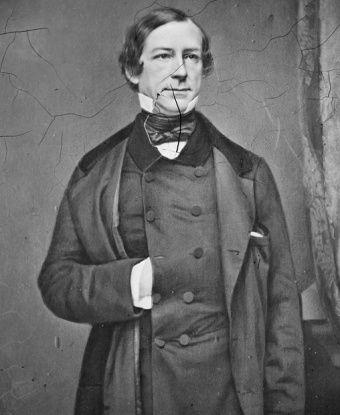Last updated: December 2, 2018
Person
Fernando Wood

Library of Congress
New York shipping merchant, nine-term Democratic Congressman and three-term Mayor of New York City, Fernando Wood turned to politics after amassing a fortune shipping goods to California during the gold rush. His public career began with his election to Congress in 1840. After failing in his reelection bid in 1842, Wood was appointed to the post of dispatch agent at New York's port authority by Secretary of State John C. Calhoun. Calhoun's successor, James Buchanan, extended his appointment until 1847, after which he focused his sights on the mayor's office.
After an initial unsuccessful attempt in 1850, Wood was elected Mayor of New York City in 1854. He immediately set out to reform city government, sponsoring a number of progressive programs, including the hiring of unemployed laborers for public works, and preserving Central Park. During his second term in office, Wood's administration fell into disarray after the Republican-dominated legislature created a competing police force, ostensibly to control the rampant corruption in the existing police department. Gangs ruled the streets. At one point, Wood himself was arrested. After being defeated for a third term in 1857, Wood established Mozart Hall, a rival political machine to Tammany Hall.
Elected to a third term as mayor in 1859, Wood favored compromise with the South before the war. He led a pro-Southern delegation to the Democratic National Convention in 1860. During the secession crisis in 1861, Wood even suggested that New York City secede from the Union and declare itself a free city republic in order to protect its lucrative cotton trade with the Confederacy. He recognized that his patronage power depended on the profits from the cotton trade.
Wood briefly supported the Union war effort after the first shots were fired at Ft. Sumter, but as the war dragged on he joined with Clement Vallandigham and other anti-war Democrats, known as Copperheads, to form the Peace Democrats. Wood seized upon voters' discontent with the war to win election to a second term in Congress in 1862. He was rejected in his reelection effort in 1864 after the tide of war turned in the Union's favor. His career in the House of Representatives however, was far from over.
Beginning in 1866, Wood was elected seven more times to Congress, the last in 1880, shortly before his death. He steadfastly opposed the reconstruction policies of the Radical Republicans. During Wood's last years in Congress, he served as chairman of the powerful Ways and Means Committee, working on tariff reform.
